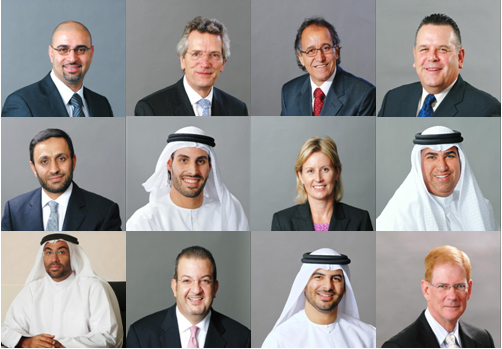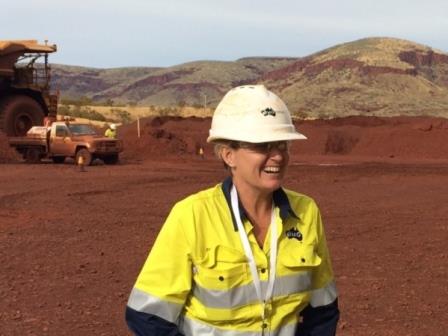Our third Day in the Life series interview subject is an inspiring woman who wears many, many hats in the business world. Named the 2014 WA Business Woman of the Year winner, Sharon Warburton, is the Executive Director – Strategy & Finance of construction giant Brookfield Multiplex. She also holds other titles including Non-Executive Director of Fortescue Metals Group (FMG), Not-for-profit Director of Princess Margaret Hospital Foundation, Management Committee Member for arcs, Advisory Board Member for Curtin Business School Asia Business Centre, and most recently founded Steel Heels, a business aimed at mentoring and supporting females in male-dominated industries.
Which begs the question on everyone’s mind – how does she do it?! Here’s a sneak peek into a typical day for Sharon and her tips for other aspiring businesswomen and entrepreneurs:
1. What time do you wake up?
Between 5am and 5.30am – depending on how many times I hit the snooze button and whether the noisy birds that hang out in my garden are in full song. My 4-year-old daughter usually wakes around 7am so I love the free hour of ‘me time’ in the morning. Usually I use this to exercise in my home gym.
2. What is the first thing you do when you wake up?
Hydrate – water.
Then I check my Brookfield Multiplex emails – most of my Brookfield Multiplex team are based on the East Coast and I am based in Perth. With the current 3 hour time difference their day is underway when my alarm is going off. So just a quick email check to deal with any super urgent matters (and the rest waits until I get into office).
I find I often do my best thinking when working out in my home gym with my IPod on or ABCNews24 in the background.
3. Breakfast – on the go, work brunch, meal with the family first etc?
Breakfast is with my daughter before she goes to school and I go to the office. I avoid early work meetings and rarely attend brekkie functions. I try very hard to have meals with Chloe every day. This is our special time.
4. How do you get to work and how long does it take?
I drive to work which can take between 20 and 40 minutes depending on traffic. I work from home if possible until after peak hour to minimise driving time but I use that time on the car phone for the entire journey – chatting to mentees, my PA or my staff.
5. Lunch?
Usually a five minute break for a quick soup or salad and I read the online newspapers. For me it’s best I don’t take a lunch break so I can get out of the office earlier at the end of the day. But there is occasionally a business lunch, seminar or networking function in the CBD. Face-to-face meetings with people are really valuable.
6. What are the typical things you do every day?
Exercise, keeps me grounded and provides thinking time. Meal times with my daughter and reading stories at bedtime. Keeping up to date on current affairs and industry news through online newspapers including all press articles on mining and construction industries. Brainstorm ideas for Steel Heels. And my Steel Heels and personal email, Facebook and Twitter accounts are time consuming but rewarding, I love the interaction with people on these.I also catch up on the phone with my boyfriend.Daydream about my next holiday…
All my work related items are structured flexibly, so I can make this all work.
7. What decisions do you make and what is their impact?
I rarely get involved in the day-to-day running of the businesses I work for, however I provide support to my colleagues when requested. I also try to get to site whenever possible – it is both the people and the on-the-ground construction activity that interests me the most about my role. As a Director I make strategic decisions impacting the long term direction of businesses which are significant and far reaching.
8. What do you love most about your job?
I love that no two days are the same, and the variety of my work given the “multiple hats” I wear. I love being able to think across the entire value chain of the businesses. And the people I work with continually inspire and challenge me. I highly value the autonomy I have and the flexibility I have around where and when I work.
9. How do manage all the tasks you need to do including Steel Heels?
I have a positive mindset – ‘yes I can’ attitude. I focus my energy on ways to get things done. I am sympathetic to the view that ‘women can’t have it all’ however I believe we can each have and do a lot more than we think. I constantly prioritise and focus on the important stuff. I have very strong boundaries to help me stay focused. I rely on a very strong and diverse support network to help me. I employ amazing and talented people and I empower them. I spend time in the evenings after my daughter is asleep working on a range of things – including FMG Board and Committee papers or developing my business: www.steelheels.com.au
I challenge myself daily to ensure my own self-confidence levels are maintained and I create space to allow personal growth. I believe self-confidence is the key to anyone’s success – whatever their gender.
10. When is hometime?
This varies. I love being able to pick up my daughter from school and try to do that whenever my diary permits. My PA has a “no meetings after 3pm” policy to give me this flexibility. My preference is to leave the office early then finish my work after my daughter is asleep.
11. How do you relax when you do get home?
Spending quality time with my daughter, hearing about her day at school and we try to go for a walk along the beach and watch the sunset. Storytime with her is lots of fun too. On Wednesday evenings I do yoga, mid-week yoga is essential for me maintaining a healthy body and mind.
I enjoy reading, taking care of my garden and occasionally will watch some trash TV to unwind.
12. How do you manage the balance between work and personal life?
Most importantly, I believe in myself and believe I can balance how I want to. Then I focus on the things that are really important to me. I accept I am not superwoman and I don’t aspire to be. My values are clearly defined; unless things are directly connected with quality time with my daughter I don’t feel the need to do them personally.
I hear myself regularly saying three things to my mentees about work/life balance: empower your team, create strong support networks, work out where you need help and get it – no guilt. And most importantly believe in yourself.
13. How has the work environment/business changed from when you first began?
When I first joined the mining industry it really was very blokey. I am so pleased to see how much it has changed over the last two decades – there is always room for improvement – however we should acknowledge the good work that has been done to date.
I used to often be the only female in the work environment and at times was the only female visiting the mine sites. I was one of the first female managers in Australia. It is so exciting to see women in many site based roles these days.
In the early part of my career it was commonplace for people to think you were promoted for reasons other than hard work. I don’t see or hear this behaviour today.
The construction industry has also changed dramatically. A management meeting ten years ago was full of rough language and all the behaviours you might imagine. There are times I recall chairing meetings where the rest of the people around the table (all male) would almost freeze you out and the meeting would happen as if you were not there. They wouldn’t talk to a female. Thankfully I don’t see that extreme behaviour now. These days the industry nurtures a very respectful environment (certainly in the organisations I work for).
The construction and mining work environments have come a long way. I would certainly recommend them as great career options for females.
14. How did it feel to win WA Business Woman of the Year?
It was a very strange feeling – I was overwhelmed and shocked and surprised. But above all I was so excited. Until the nomination, I did not realise I had such a powerful career story to tell nor did I realise that others would want to acknowledge my successes.
I had many friends, family and colleagues there with me on the night. It was so much fun to be able to celebrate with them. Celebrating success is so fundamental to creating a winning culture. I was surprised about how many women contacted me after the win, seeking mentoring support.
This, as well as the self-confidence boost I got from winning the award, led me to create www.steelheels.com.au.
15. Who and/or what inspires you?
My desire to provide for my daughter and be a role model for younger peers in male dominated industries drives and inspires me. I hope sharing my experiences helps attract and retain women in these industries.
I am motivated and inspired by many. Top of my list at the moment is our Foreign Minister Julie Bishop. I admire her ability to stand tall and outperform on the world stage, shine in a male dominated environment and to maintain her health and fitness. I absolutely love her jewellery collection too!
16. Why do you do what you do?
I do things because they make me happy. I do things that are fun and which I enjoy. If something is not fun for me then I stop doing it. I am passionate about supporting others in their quest to find success in what have been traditionally male dominated environments. These days I get just as much of a kick out of this work as I do closing a big deal or locking away another strategic plan.
I am inspired to connect with kids in the bush who dare to dream. As a country kid myself, I know what it takes to work hard and succeed around the world. I will encourage them to think big and to go after their dreams.
I have done the hard yards particularly around having self-confidence in the work environment. I am inspired to share my learnings with the next generation with the aim of helping to achieve greater gender diversity in the workplace. This is my vision for www.steelheels.com.au.
17. Tips for aspiring businesswomen?
My lessons for success:
- Act with confidence. “Focus on why you can do things, rather than why you can’t.”
- Learn from your peers. “Don’t underestimate the power of what you can learn from those around you in your current work environment.”
- Be authentic and open. “Show your emotions, communicate openly and always be approachable and supporting”.
- Identify good leaders in the community and follow them. “You can follow a leader and learn so much from the way they’re doing things.”
- Expand your skills and knowledge. “As early as you can in your career, look for roles to broaden your experience.”
- Develop experience in strategy. “Great leaders have the ability to think strategically. Get some experience in strategy, whether that’s through reading or study or coat-tailing someone in leadership roles in your organisation.”
18. How do you define success?
Success is anything that gives me the feelings of contentment and happiness.
19. What challenges have you faced in the business and how do you overcome them?
There have been many challenges over the years. Some that come to mind are:
(1) In the early part of my career it was commonplace for people to think I was promoted for reasons other than hard work. I was ill-equipped to deal with such feedback and I responded by putting my head down and working even harder.
(2) These days I am a ‘reformed workaholic’. I found the transition from globetrotting workaholic to flexible working Mum very challenging. Dealing with feelings of guilt was really challenging – guilt that I was not home with my daughter 24/7, guilt that I wasn’t working the hours I used to, incorrectly assessing what was required to support my work colleagues! I relied heavy on my friends, family and my mentors during this period. I spoke openly of my thoughts and found comfort from sharing my feelings regularly. I found that people did not judge me, and the productivity of both myself and my team increased because we were in a positive open environment.
(3) I was announced 2014 Telstra WA Business Woman of the Year but did not achieve success at the National awards. Through not achieving this goal, I realised why winning is so important to me. To succeed in the male dominated industries of construction/mining I have had to outperform to feel accepted and I always ‘won’. Acknowledging success without winning has been a challenge and I congratulate the winners again – these women deserve huge accolades for the work they do. I overcame this sense of failure by sharing my thoughts via my blog post Why winning isn’t everything. I truly believe this has been a defining moment of personal growth and I’m looking forward to what the future holds.
What challenges have you faced in the workplace and how have you overcome them? Tell us in the comments below!
Photo credit: Shaun Patterson





